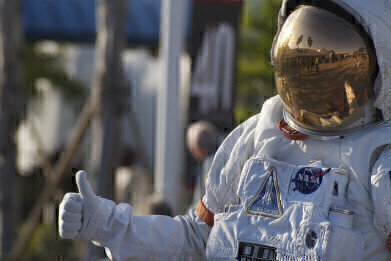News & Views
You Could Be the Next Tim Peake. Here's How…
Jan 08 2016
In December 2015, Tim Peake made history as the first British European Space Agency (ESA) astronaut to live on board the International Space Station. It was an incredible feat, for both Peake as an individual, and European space research as a whole. He described the accomplishment as “A proud moment for me, and I hope an inspiring moment for my country.”
From rural school boy to outer space astronaut
Like many little kids with big dreams, Peake always fantasised about becoming an astronaut. After a lifelong fascination with flying, years of pilot training and intensive education at the ESA, Peake finally turned his dream into a realty. From a West Sussex school boy to one of the world’s most successful astronauts, Peake is the perfect example of how journeys into outer space are never impossible.
So how can everyday people unlock the door to a career as an astronaut? According to the pros, the first step is to nurture an intrinsic fascination with space.
Technical qualifications
Of course, passion isn’t everything. Aspiring astronauts will also need to be armed with a serious skillset. Going into orbit goes hand in hand with tremendous responsibility, which means astronauts must have the knowledge and confidence to take on hugely complex tasks. According to the ESA advanced education in scientific or technical disciplines is a must, complemented by “an outstanding professional background in research, application or education fields.” The ability to navigate computer systems and applications is a must, while past experience with aircrafts is a bonus. Put simply, astronauts are multi-skilled professionals who must be capable of holding their own in extremely dangerous environments.
A multi-faceted skillset
Being physically fit is also a key requirement, as the conditions in outer space are not for the faint hearted. Endurance is essential, which is why astronauts are put through intensive periods of training to ensure they can withstand the physical stress of missions.
Finally, the ability to demonstrate exceptional teamwork is crucial. Astronauts are forced to bunk in confined spaces with fellow colleagues for unimaginably long periods of time. As such, an affinity for teamwork and adaptability, as well as a sense of humour are essential.
Often, successful astronauts like Tim Peake condition themselves for outer space missions by spending time in harsh environments such as Alaska. He ventured here with Raleigh International, a trip that cannoned him out his comfort zone. For more insight into life on the final frontiers, ‘Tabletop Electron Microscopy at the British Antarctic Survey’ is full of first hand insights from the Royal Research Ship, James Clark Ross.
Image via Flickr Creative Commons. Photo credits: Paul Hudson
Digital Edition
LMUK 49.7 Nov 2024
November 2024
News - Research & Events News - News & Views Articles - They’re burning the labs... Spotlight Features - Incubators, Freezers & Cooling Equipment - Pumps, Valves & Liquid Hand...
View all digital editions
Events
Nov 18 2024 Shanghai, China
Nov 20 2024 Karachi, Pakistan
Nov 27 2024 Istanbul, Turkey
Jan 22 2025 Tokyo, Japan
Jan 22 2025 Birmingham, UK




.jpg)














